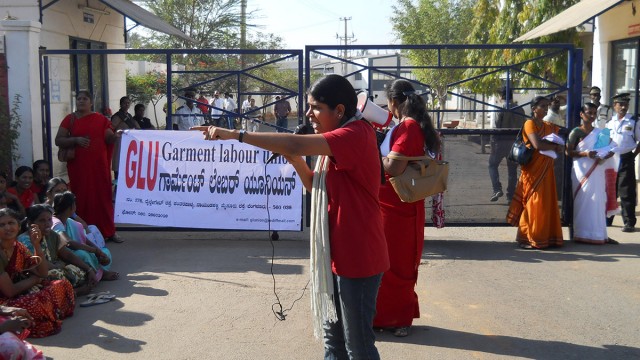Background
In 2002, a labour rights organisation based in Bangalore, began organizing workers in the garment sector with the objective of improving working conditions. They were supported by Oxfam-GB in their efforts. Field activists were recruited for conducting worker education among garment workers and all of them had previously worked in various garment factories in Bangalore.
The approach of that NGO was to promote pre-union social organisation of workers. Most workers in the garment sector are first generation industrial workers and largely from rural areas. New to the city and to the industry they are very vulnerable and hesitate to join unions for fear of victimization by the management. The initial step in 2004 was to form another NGO. It worked mostly in the communities where garment workers lived.
Workers soon felt that a community- based organisation cannot effectively deal with the issues at the workplace. Training and awareness generation programmes that both above mentioned NGOs conducted, helped workers gather courage to form a trade union. In 2006, a trade union was formed, unfortunately with male leadership!
2008-2012 was a period of struggle and sacrifice for the women leaders who were active in the union and the struggle clearly was against patriarchy in the form of male union leaders who trampled upon rights of women activists. It was clear for the women activists of the union that they have to fight against misogynist patriarchy within unions and the profit-driven business interests at the same time!
Having experienced the power of union organizing, the aggrieved women activists decided to form an independent women-led trade union in the garment sector. The result is the Garment Labour Union (GLU), which is today looked at by garment workers in Bangalore city with great hope and expectations!
Challenges
Forming trade unions in garment factories is a challenging task. Managements go to great lengths to prevent trade unions taking root in factories. Workers are busy from morning till evening meeting production targets.
Getting organized for a common cause is new to most workers. Co-workers at the work place and relatives at home discourage them from getting involved in union activities. Taking on the might of the rich and powerful industry bosses is beyond their ability, they are told.
Involvement in unions means attending meetings regularly and participation in actions such as protests. Factory-owners who are hostile to unionization resort to harassment of union members and even retrench them from their jobs.
Since the wages of garment workers are very low, they find it difficult to contribute regularly to the union funds. Absence of sufficient funds to carry on union activities is a constraint for unions such as GLU whose members are underpaid women workers.
Raising Awareness about Workers Rights
It is important to educate workers about their rights so that they are capable and willing to take action to claim their rights. GLU adopts various methods for worker education and awareness building. Workers are met individually and in groups and activists talk to them about the need to be aware of labor rights. These meetings take place near the factories as well as in the living areas of the community. Activists use printed material such as leaflets and newsletters to disseminate information. Street Theatre is another means of communicating with workers and inspiring them to work collectively to improve working conditions.

